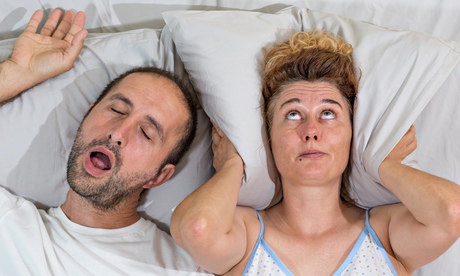
I’ve been told I snore. Apparently it’s a quiet, nasal, snuffly sound, although I’m in denial, because I’ve never heard it. But those long-suffering partners who have to endure the snorers are the tortured witnesses who testify against us. We may wake fresh and revived after a full night in dreamland but, on their side of the bed, they simmer in sleep-deprived rage at another interrupted night.
No one knows quite how many of us snore – but it’s certainly a big problem (estimates range from 30-50%) and a growing one. For partners of snorers (often wives, since twice as many men as women appear to be afflicted) it can lead to misery and even marital rifts. For serious snorers, it can put strain on their own bodies.
At one end of the spectrum of sleep disruption is “obstructive sleep apnea” (OSA), in which the soft tissues of the neck and upper airway relax and collapse repeatedly during the night, actually stopping breathing for over 10 seconds – to the point where the body can suffer a lack of oxygen and you can wake up gasping or choking. If this happens many times a night, it can increase the risk of heart problems and reduced lung capacity. It is thought that about 2% of children suffer from OSA and about 4% in mid-life, but the number could be much higher, as one study in 1997 suggested that over 80% of sufferers remained undiagnosed. Because of the problems it causes, some sufferers of OSA may opt for surgery to reduce the soft palate, or even to reposition the lower jaw to open up the airway.
However, most of us suffer simply from snoring, the noisier but less serious cousin of OSA. In fact, snoring may be more of a problem for those with whom we wish to share our sleep than for ourselves. So what’s the cure? Traditionally, there has been a range of advice. Because snoring is caused by the fatty tissue in the neck and throat vibrating as our muscles relax in sleep, losing weight is usually the first recommendation. But that’s easier said than done.
For serious snorers, there are minimally invasive surgeries – one developed this year uses absorbable sutures to stiffen the soft palate, and in a small study of 35 patients in Korea had 88% patient satisfaction (as well as reduced “bed partners’ complaints”). More practical advice includes avoiding alcohol before bed, and putting a tennis ball in the back pocket of your pyjama bottoms (should you happen to have pockets) to stop you sleeping on your back – the position most likely to cause snoring.
Then there’s a list of devices you can wear in bed that are supposed to help: nasal strips to hold open the nostrils, or chin straps and mouth shields to stop you from breathing through your mouth at night, or to shift the lower jaw forwards to help open the airway. Unless purpose-built by a dentist for an individual patient, these do not have much scientific backing – nor, it has to be said, are they likely to enhance shared romantic nights.
And so the field was wide open for scientific researchers in pursuit of a more reliable – and subtle – cure. Enter Brazilian researcher Vanessa Ieto and her team at the Sleep Laboratory of Sao Paulo medical school. Working on the premise that tightening and strengthening the muscles in the mouth and neck should make them less floppy and flappy in sleep, Ieto’s team devised a number of daily exercises designed to do just that. Thirty-nine volunteers were brought into the lab where their snoring habits were recorded and analysed. Researchers placed a microphone by snorers’ beds to record their nightly chorus. They then detected and analysed their snoring using an algorithm that assigned each person a “snore index”, measuring the number of snores over 36 decibels per hour, and a “total snore score”, a measure of how bad the problem was over the entire night.
The snorers were then divided into two groups and sent off for three months: one group was given the nasal strips and one group the exercises. After their three months were up, both groups were tested again. The people wearing nasal strips snored as badly as ever but the group who did daily exercises were greatly improved. According to their snore indices, they snored much less often (down by a third), but, even more impressively, the power of their snoring was down by 59%. So, not a complete cure necessarily, but since this is a new study, who knows whether the snoring would reduce even further if they kept the exercises up for longer?
The team is continuing its research: as Geraldo Lorenzi-Filho, one of the researchers, explains: “We are currently evaluating the effects of the exercises on the anatomical structures as evaluated by MRI.”
So, for those of you suffering from the effects of snoring, help may, at last, be on hand. Ieto’s team has helped create a guide to these exercises with BBC2’s health programme Trust Me, I’m a Doctor, should you wish to try them for yourself – or subtly forward them on to a partner. Alternatively, you can take up the didgeridoo, which apparently has the same neck and mouth toning effect – but that’s another load of painful noise altogether.
A guide to the exercises and other top tips for snoring can be seen on BBC iPlayer or at the BBCiWonder guide

